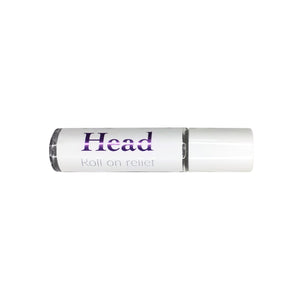Your Cart is Empty
- Shop
- Therapist Discount
- About Us
- FAQ, Blog & Downloads
- My Account
- Courses
- Saturday Club
- Free Blending Series
- Product Catalogue
- Contact Us
- 01455 251020
- Login


Head is formulated to calm head tension, with essential oils of calming Roman chamomile; everyday stress-relieving and relaxing lavender; nerve-soothing peppermint; and anti-inflammatory, fatigue-busting rosemary. All in silky vegetable oils of apricot and coconut. (10ml)
To use: apply to the forehead or temples. External use only.

Apricot kernel oil has traditionally been incorporated into cosmetic products for its softening action on the skin and is used in soaps and cold creams. Apricot is a natural moisturiser, helping to prevent dry, itchy skin.
Coconut fractionated oil (fat removed to make the product an oil and not a solid) is emollient and nourishing and due to its clear nature is the perfect base for applying to wrists and temples.
This oil is anti-inflammatory (reduces inflammation or swelling), anti-spasmodic (relieves muscle tension and spasms), calming, digestive and menstrual. It is used in particular, to treat eczema, arthritis, inflamed skin, headaches, indigestion, PMT, menopausal symptoms and conjunctivitis.
Chamomile is often used as a relaxant to calm frayed nerves, such as in a massage or consumed in a tea. This use is supported by a study finding that massages of Roman Chamomile for 20 minutes, 3 times a week significantly improved self-esteem and decreased anxiety of cancer patients (Srivastava, Shankar and Gupta, 2010).
Chamomile roman essential oil is also used as a pain relief, a study carried out in 2015 involved people applying dilute chamomile essential oil onto skin to treat osteoarthritis (Joint condition), results showed that participants who used the oil were less in need of using pain relief compared to participants who did not (Shoara et al., 2015).
Roman Chamomile has a long history of medicinal use and is commonly employed for treating nausea and inflammation. Chamomile is also often used as a relaxant to calm frayed nerves.
With a wide range of therapeutic effects. It is analgesic (pain-relieving), antibacterial and antifungal, anti-inflammatory (reduces inflammation or swelling), antispasmodic (relieves muscle tension and spasms), sedative (calming and relaxing), cardiotonic (has a positive impact on the heart), cicatrisant (healing), emmenagogic (menstrual aid) and hypotensive (lowers blood pressure). It is best known for its stress-relieving properties, treating headaches, burns, wounds, irregular periods, asthma, eczema, acne, candida, aches and pains and high blood pressure.
Moss et al. (2003) found inhalation of lavender for 5 minutes significantly reduced produced working memory, reaction times and attention in memory and attention-based tasks compared to controls, suggesting a central nervous system depressant effect.
Lavender oil has anti-inflammatory and analgesic properties. They are quite effective for treating pains that arise from muscle stress and tension. Lavender oil can also ease swelling and improve blood circulation. (Family Chiropractic Plus, 2018)
This oil has a wide range of therapeutic uses and is a versatile essential oil. Some of these properties are analgesic (pain-relieving), anti-inflammatory (reduces inflammation or swelling), anti-migraine (helps with migraines), antispasmodic (relieves muscle tension and spasms), antiviral, carminative (calming to the body and mind), digestive, expectorant (thins and loosens mucus), mucolytic (Mucus clearing), neurotonic (a tonic for the mind) and uterotonic (giving tone for the uterus). It is used for migraine, neuralgia, bronchitis, sinusitis, colic, herpes, indigestion, nausea, colitis, IBS, irregular periods, apathy and nervous conditions.
Peppermint has sharp and sweet refreshing notes mainly consisting of alcohols and ketones which provide a refreshing, uplifting and elevating feel that awakens the senses to start the day.
Peppermint essential oil is reportedly a central nervous system stimulant that is supported by animal studies showing an increase in activity of mice upon inhalation of peppermint essential oil compared to no aromas (Dobetsberger and Buchbauer, 2011).
Also, peppermint’s central nervous system stimulating effect on humans was investigated in a study of 44 healthy volunteers. A concealed essential oil diffuser was used to deliver the essential oil via inhalation, and several cognitive parameters were measured compared to a control of no aromas of essential oils. The data showed significantly increased alertness reported by volunteers using a mood scale were found compared to controls, as well as a significant increase in memory function (Moss et al., 2008). A small trial also reported that peppermint odour acted as a central nervous system stimulant; significantly increasing alertness, motivation, and performance and decreasing fatigue and frustration in a simulated driving test (Raudenbush et al., 2009).
A versatile essential oil. It is analgesic (pain-relieving), antibacterial and antifungal, anti-inflammatory (reduces inflammation or swelling), antispasmodic (relieves muscle tension and spasms), decongestant (helps diminish blockage), diuretic (stimulates the secretion of urine), mucolytic (Mucus clearing), and neurotonic (a tonic for the mind). It is most often employed for treating arthritis, rheumatism, fluid retention and cellulite, persistent coughs, asthma, sinusitis, fatigue, hysteria and loss of memory.
Rosemary has a light, uplifting and refreshing blend of notes from the monoterpenes, ketones and oxides comprising of this. The oil is known to stimulate the respiratory system and alert the mind. Rosemary was considered as a sacred plant and a symbol of regeneration by the ancient Greeks, Romans and Egyptians who used it around graves to bring peace to the dead and give comfort to the living (Sellar, 1992).
Also, rosemary is used as an antidepressant and mental stimulant to ‘clear the mind’, which is supported by a small trial showing that aroma of rosemary oil significantly increased alertness and quality of memory as well as contentedness in a small group of healthy adults (Moss et al., 2003).
“Preliminary evidence suggest that rosemary oil may help reduce tissue inflammation that can lead to swelling, pain and stiffness. It may do so by stemming the migration of white blood cells to injured tissues to release inflammatory chemicals”
Rosemary oil may help increase circulation by expanding the blood vessels, thereby warming the blood so that can reach the body parts like fingers and toes. (McCulloch, 2018)